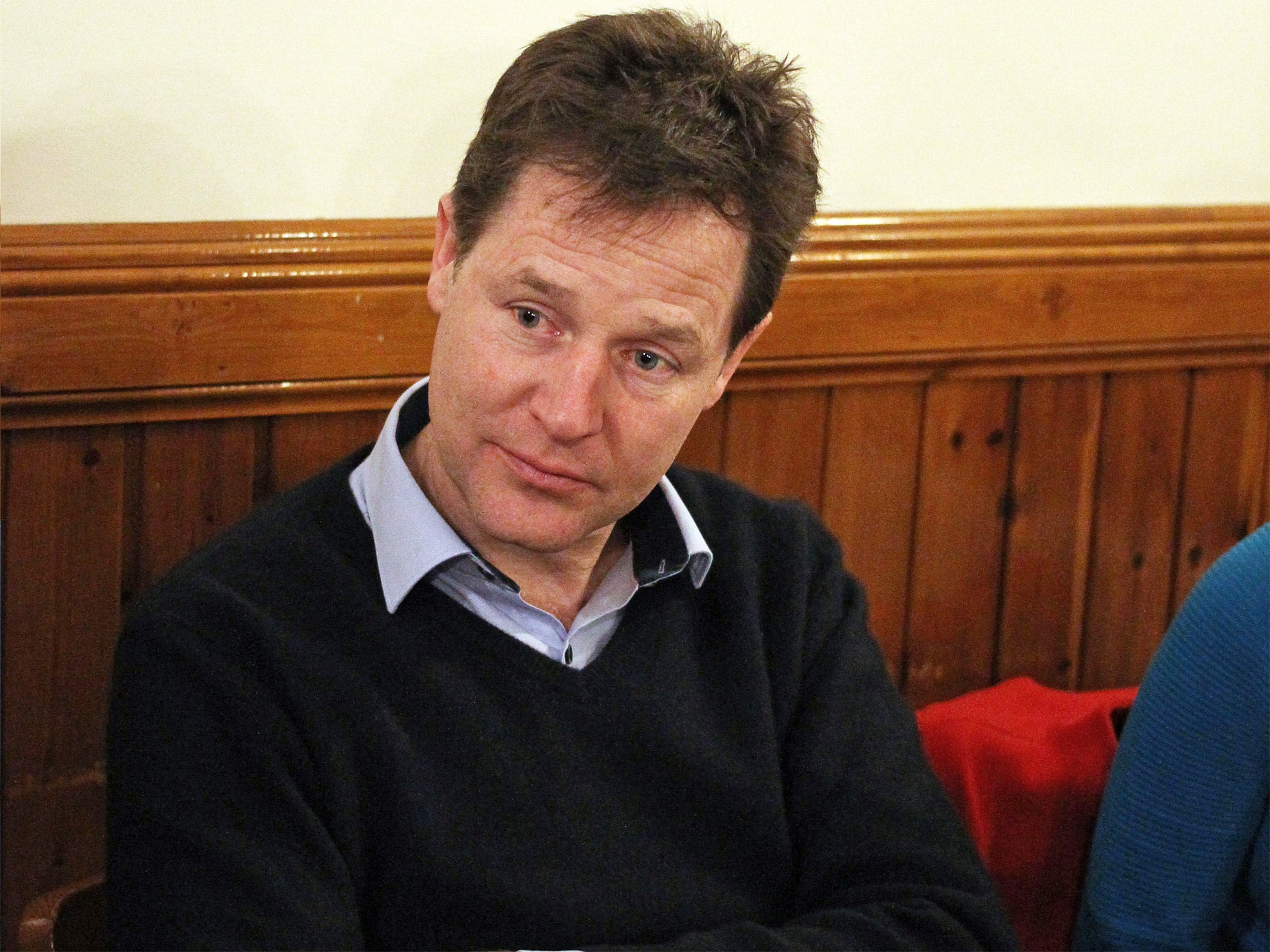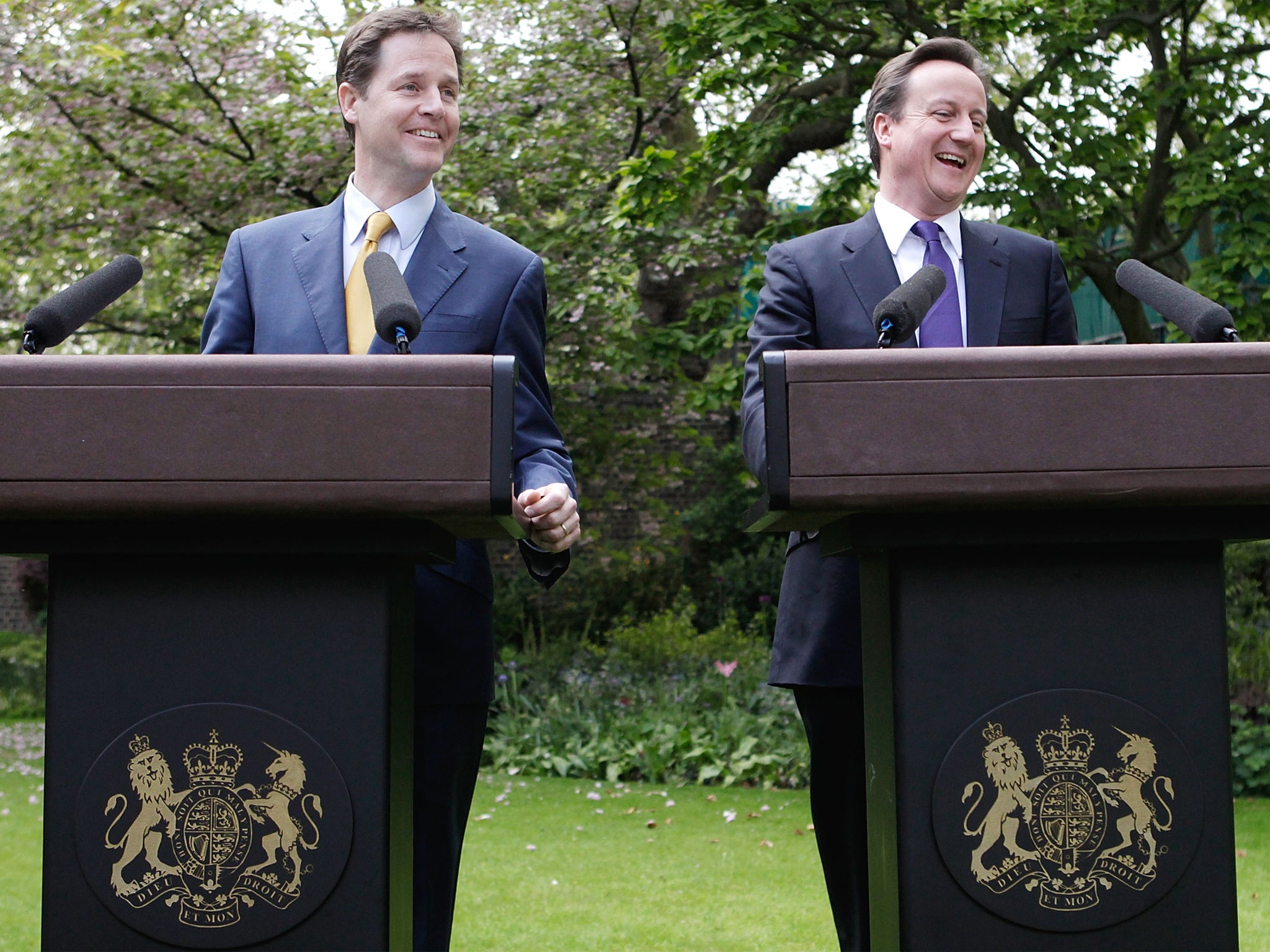Nick Clegg interview: My fight to stop the nasty party getting its way
Nick Clegg remains optimistic despite dismal poll ratings for Lib Dems

Your support helps us to tell the story
From reproductive rights to climate change to Big Tech, The Independent is on the ground when the story is developing. Whether it's investigating the financials of Elon Musk's pro-Trump PAC or producing our latest documentary, 'The A Word', which shines a light on the American women fighting for reproductive rights, we know how important it is to parse out the facts from the messaging.
At such a critical moment in US history, we need reporters on the ground. Your donation allows us to keep sending journalists to speak to both sides of the story.
The Independent is trusted by Americans across the entire political spectrum. And unlike many other quality news outlets, we choose not to lock Americans out of our reporting and analysis with paywalls. We believe quality journalism should be available to everyone, paid for by those who can afford it.
Your support makes all the difference.It can’t be easy being Nick Clegg. Barely five years ago he was being hailed as the most popular leader since Churchill, after a bravura performance in the television debates. Today, the Liberal Democrats are barely hitting double digits and his personal rating is less than minus 50 per cent.
To make matters worse, he has been “banned from the biscuit tin” after putting on a little extra weight, and has even given up smoking. “I’m vaping my way through the cravings,” he explains.
Part of the problem is that Clegg is still trying to escape from the shadow of tuition fees. The policy has, he admits, caused him “a lot of heartache.”
“Looking back, I wish we’d called it a graduate tax,” he says. “You pay your tax if you can afford to; you don’t if you can’t.” Clegg is sticking by the policy, and refuses to back Ed Miliband’s plans to reduce fees to £6,000. “What they’re doing is penalising pensioners on modest incomes in order to fund a tax break just for very, very wealthy graduates in 20, 30, 40 years’ time.”
The backlash is all too real for Clegg, who’s facing a challenge to hold his seat in the Sheffield Hallam constituency, where there is a large student population. Two polls have put his Labour challenger in the lead. Clegg says he is “confident but not complacent” and will “work his socks off” for people’s support.
There’s also the small matter of winning votes for the Lib Dems nationally. He thinks it’s “no surprise” that his party is doing so badly. “You have to get your hands dirty and take risks” when you’re in power, and can’t expect to cut the deficit in half and “emerge blemish-free”.
For all the talk of the economy, Clegg lists equal marriage as his proudest achievement. “After the legislation passed, a friend of mine who’s gay told me that, walking past Moss Bros, he saw a window display of two grooms. He’s not in a relationship, with no current plans to get married. But he said that, as he passed that shop window, he literally felt himself walk a bit taller.”

Gay rights remains high on the agenda. Clegg singles out Vladimir Putin’s Russia for criticism, and says that the “basic value” of freedom of sexuality is “trampled on” every day. He promises to promote a strategy of decriminalising homosexuality and supporting gay marriage around the world.
Closer to home, Clegg admits that his parliamentary party lags behind in terms of equality. In his words, it is, “too male and pale”. The Deputy Prime Minister says he is planning measures to improve his party’s diversity after the May election, but fears quotas can be viewed as “tokenistic”. Given Clegg has been leader of his party for eight years now, it’s not clear why he hasn’t taken effective action sooner.
Despite the abysmal poll numbers, Clegg genuinely seems to believe that things will turn round in time. So what is it that will change voters’ minds? His key promises include raising the income tax threshold to £12,500; and investing £8bn in the NHS, with a guarantee of equal billing for mental health, whilst balancing the books.
He hopes that on polling day people will ask themselves, “Do I want a government which panders to the extremes, or instead promises more opportunity for everyone by creating a strong economy and a fair society?”
The difficulty is getting the message across. “In that culture of left vs right it’s hard to prove a negative – as in stopping your coalition partner from doing something extreme.” He adds: “There have been many mad and sometimes downright nasty policies the Tories have cooked up which we stopped ever seeing the light of day”.
It’s unsurprising, then, that Clegg thinks that his party has received less credit that it deserves. He highlights the pupil premium for disadvantaged schoolchildren which was introduced by the Coalition, and points out that this was “front and centre” of his manifesto in 2010. Ending child detention for immigration purposes is an “unsung achievement”.
But even if the Lib Dems haemorrhage seats, Clegg could still hold the trump card if, as expected, there is a hung Parliament. If he does, he won’t be doing the Tories any favours. Instead, he is sticking to the ground rules he set in 2010.
“As [with] last time, it is right that the party with the biggest mandate from the British people – the most votes and the most seats – should be given the first opportunity to reach out to other parties,” he insists, believing that this would be working in the national interest to provide a stable government.
Clegg does however, predict that it will be obvious who has the biggest mandate, and “the idea that there will be a sort of photo finish is extremely unlikely”.
He won’t be drawn on his red lines in a potential coalition agreement, although the “front-page policies” in the manifesto will be his “top priorities”. He is enthusiastic about education from “cradle to college” and would be keen to ring-fence the education budget. An even more vexed question is whether Clegg himself will still be around to sort out the mess, even if he does retain his seat.
When I ask him if he will be the Lib Dem leader at the end of the year, his response is simply, “Yes.”
What about his potential challengers? Tim Farron was slapped down by Lord Ashdown last month, apparently for being on manoeuvres, but Clegg is far kinder to his colleague, stating that “Tim, Paddy and I – we are all cut from the same yellow cloth… Tim is one of the best and brightest Liberal Democrat MPs.” He maintains that the pair “actually get on well”. I’m not sure I believe him.
Join our commenting forum
Join thought-provoking conversations, follow other Independent readers and see their replies
Comments